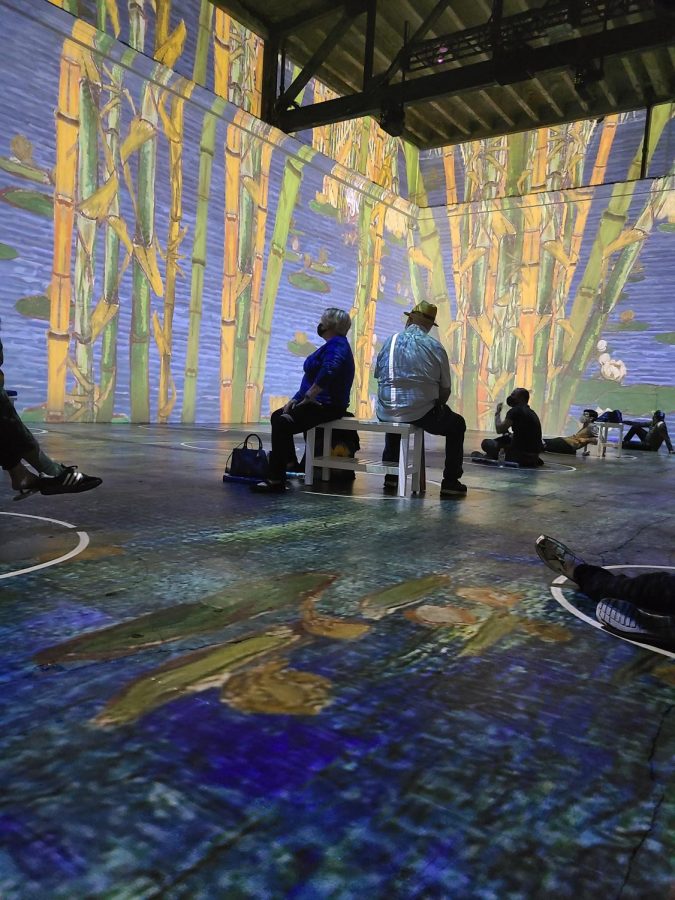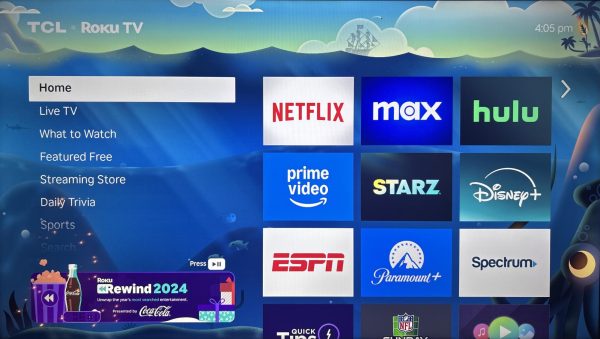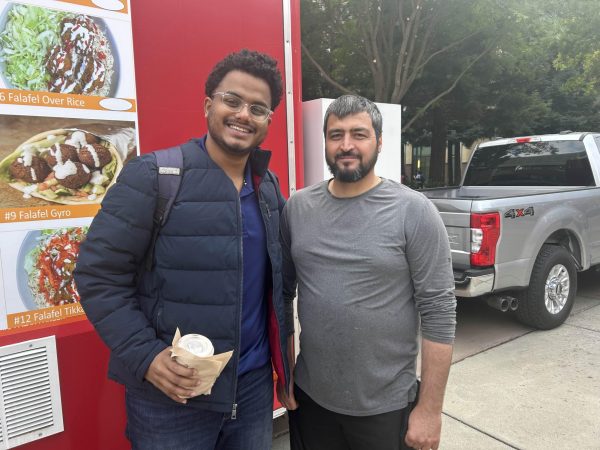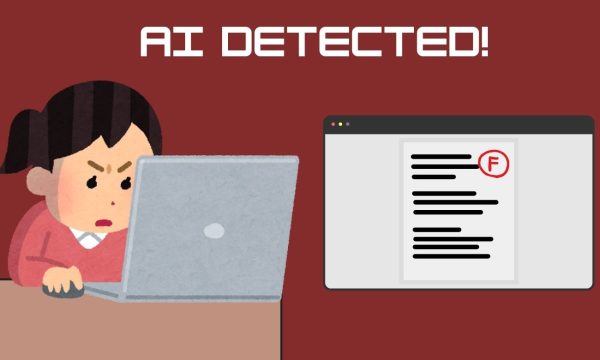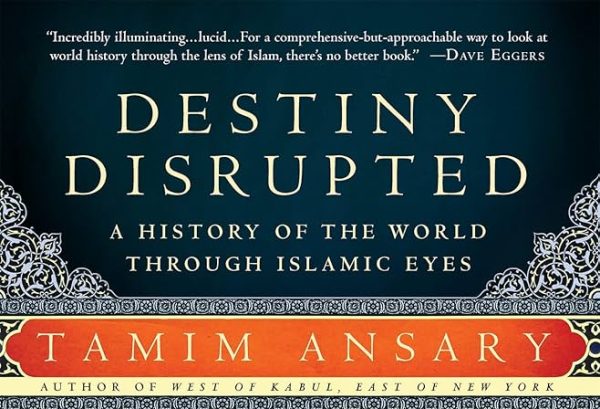Pandemic-stricken arts economy questions meaning of ‘essential’
Photo by Shae Pastrana. The Immersive Van Gogh Exhibit experience.
Nearly 130 years after his death, Van Gogh still lives. I struggle to find words to describe my experience at the Immersive Van Gogh Exhibit that opened last month in San Francisco.
Overwhelmed with emotion and safely distanced from others, I sat within his brushstrokes as I watched his story unfold. The exhibit’s service provided layered aesthetics of music, motion picture and traditional art that relayed to me the necessity of art that equates to any other “essential service.”
In lockdown’s first few weeks, I questioned the pandemic’s effects on the gig economy, particularly visual and performing arts. Businesses seemingly closed as fast as cases and social-distancing increased.
Chico State’s School of the Arts struggled as campus closed important workspaces last year. Without productions and studios, students and employees of music and fine arts lost jobs and other opportunities.
Closed music venues and cancelled events ruined production companies and music’s gig economy. I watched venues and galleries close along with the cancellation of all my planned music events, as some restaurants, salons and other services survived, albeit barely.
Of course, I doubt any reason to complain about access to take-out, delivery and grocery stores during the pandemic. Everyone needs to eat.
However, whether or not society deemed the arts “essential” remains a curiosity for me. Do we define “essential” based on generated income, value to society or substantial contribution to gross domestic product? I think artists and performers are essential enough to society’s progress to qualify for some sort of relief, if not unemployment benefits.
Artists like Van Gogh, and from before his time, influence us today. We study cave paintings to understand our origins. Classical music continues to inspire people and may even help some focus. We pay comedians because laughter is still “the best medicine.” Without supporting the local talent that inspires us, I think tragedy would ensue. This kind of support secures a strong record of culture for future generations.
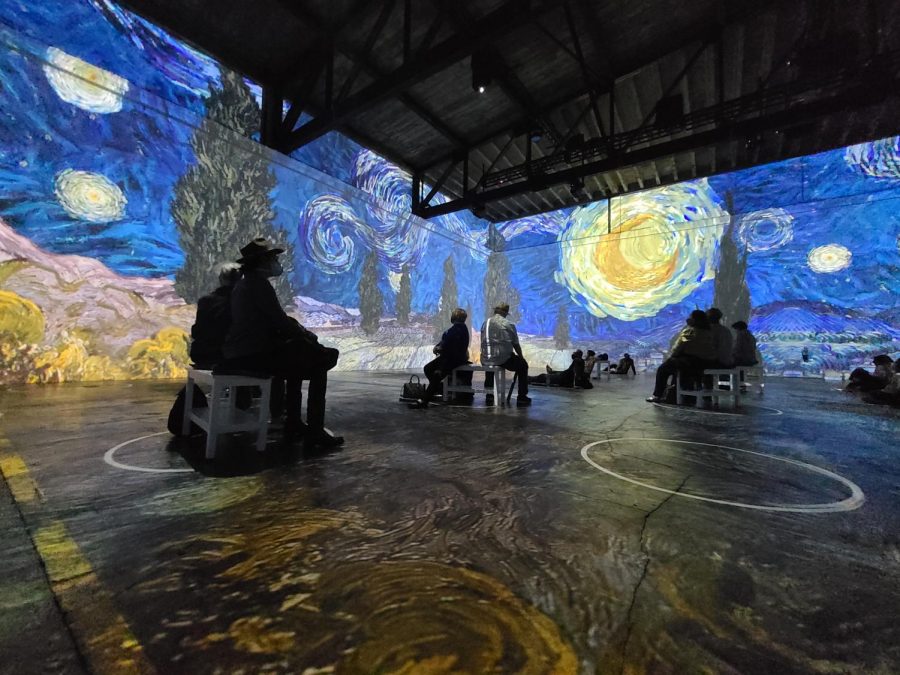
Predating written language, art channels communication through the culture that influences it. As social animals, we need art; I consider it to be very essential.
“Art is communication during isolation,” said non-binary and queer Bengali-American artist Art Twink of Chico. “It’s outreach to people who feel lonely,” they added, referring to the pandemic’s psychological effects, notably on underrepresented people.
Art Twink illustrated the children’s book, “My Rainbow,” published last year by Kokila, an imprint of the publishing company Penguin Books USA.
Before the pandemic, Art Twink already struggled with marginalization and bigotry in Chico. Referring to oppression, including discrimination, they call the cruelties here worse than anywhere else they’ve experienced in California.
Recognizing Art Twink’s talent, Kokila reached out to them for a new opportunity. Art Twink is now working on Kokila’s upcoming book, “My Paati’s Saaris,” by Jyoti Gopal.
Art Twink credited Kokila, whose staff is mostly women of color, for making progress possible. “Marginalized people look out for fellow marginalized people, and I really do not think I would have gotten these opportunities elsewhere,” they said.
Bands and collectives look out for one another as well as independent artists. The pandemic layered challenges for the work of group artists. Fortunately, some overcame.
Chico’s Smokey The Groove cancelled all shows lined up last year after lockdown. Band members encountered other related challenges, such as when trombonist Dean Simcox was laid off from his side job. Band meetings on Zoom followed a lack of practice days that resulted from health concerns.
Despite challenges, the band recuperates. Although not preferred, livestreams benefitted fans and income. Simcox said he used this past year as an opportunity to help band practice by exploring a “more positive headspace.”
Drummer Cody Naab said people over the last year realize the importance of music that’s often overlooked by others. From a therapeutic perspective, he called live-music attendance a way for people to “scratch that itch in life.”
“It’s like a whole ecosystem,” Simcox said about the layers of work in a music community. Like musicians, the pandemic left technical and set-up crews unemployed. Speaking of this misfortune, Bassist Austin Farwell doubted that society deems the arts as essential.
With a third album around the corner, Smokey The Groove is hoping for a live performance on May 22 at Union in Oroville, in what could be their first show since February last year.
We now see live shows being scheduled for the first time in about a year. Some artists and musicians expanded their work outside of their usual projects to help the community survive.
Trumpet-player Lizzie Bernard, of Chico, didn’t know her band, Ants in my Eyes Johnson, would play their last gig before lockdown at The Maltese. Like Simcox, she lost her side job in the beginning. After they live streamed a performance to raise money for The Birdcage Theatre in Oroville, rising cases prompted them to cancel practices altogether.
Bernard said that, with most members vaccinated now, the band hopes to resume annual rehearsals in August.
The new punk band, The Flaming Shits, resulted from the quarantine bubble of Bernard and two members from her other band. Excited, she said this project has given her a great opportunity to write new material. “My creative juices really started flowing and I wrote a ton of songs, which has been a very new thing for me,” Bernard said.
Community empowerment, teambuilding, and new ideas emerge from the struggles of last year. For some artists, new opportunities arose from disadvantages.
Artist and clown Van Jazmin of Los Angeles relied on parties and nightlife for his work. “One of my biggest challenges was losing the event-related clientele and having to refocus on things I could do virtually,” he said.
Jazmin said he’s grateful for his sale of merchandise during the pandemic. His work shifted to archival projects, including a book of illustrations. Some recent work includes custom VHS tapes and another published book about his experiences from the Great Recession.
The Van Gogh Exhibit was planned before the pandemic. Seeing how creative communities made it happen in spite of everything enlightens us to our essential need for the arts, whether for therapy or inspiration. For me, those elements further enrich community progress.
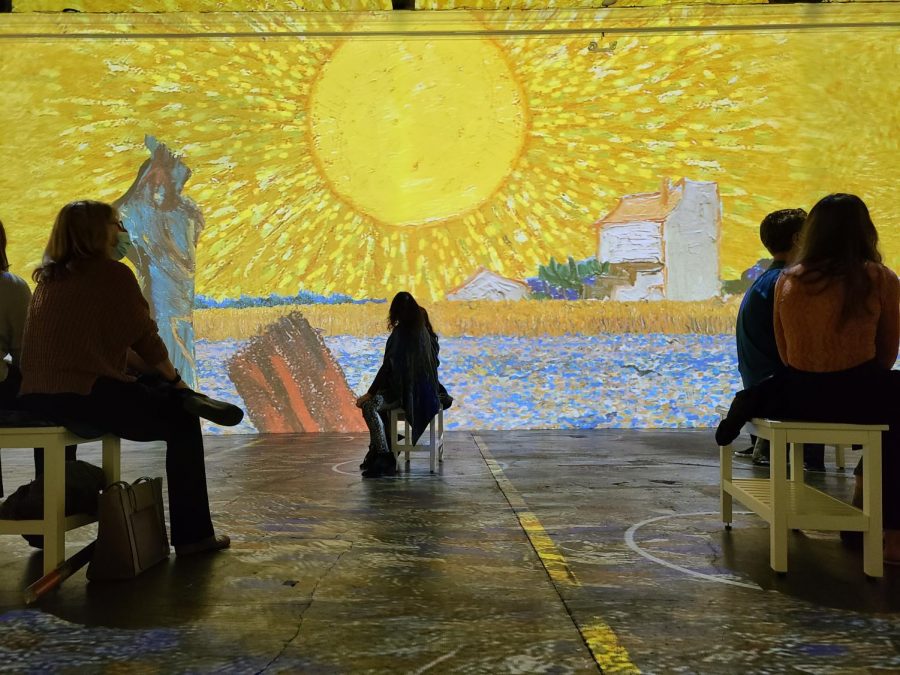
The art community is slowly reviving from last year’s devastation. Chico’s Wellspring Art Collective hosts the Flume Street Market every Saturday from 11 a.m. to 4 p.m. Vendors and art lovers can visit at 740 Flume St.
The Collective’s Upcycled Makers Market takes place at 11 a.m. to 4 p.m. on May 22, at the Chico Art Center parking lot on 450 Orange St. Attendants can learn more about upcycling, an eco-friendly craft of reusing textiles or clothes for new projects. The market will accept donated materials and tools for artists, and display creations for sale.
Looking back on last year, I wonder how we could’ve protected our artists and performers. Although many had side jobs, some of which were still lost, others worked full-time with their skill. I hope for a culture in which everyone normally sees a career’s value beyond income. But I’m not positive if we have that now.
Why do we have the “starving-artist” trope when the long-lasting impact of their work remains obvious? Nobody needs to be rich. But, to be recognized as essential is important for anyone’s work of passion. Inspiration from the arts can be a subtle, yet strong, force of healing.
Immersed in Gogh’s work, I felt as if I experienced his struggle to bring the perfection of nature’s chaos into the human form. The feeling was too familiar to me, a hobby painter and nature enthusiast who also experienced depression. Many know the story of Gogh’s struggle with mental illness throughout his profession. Pushing through his tragic story, his work demands to fulfill an essential need in society to this day.
Shae Pastrana can be reached at [email protected] and @PastranaShae on Twitter.



